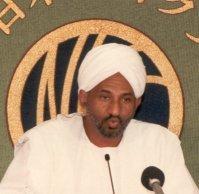INTERVIEW-Darfur sanctions should be last resort-Sudan ex-PM
By Tom Perry
CAIRO, July 29 (Reuters) – Sanctions should be a last resort in efforts to persuade Sudan’s government to quell violence in the western Darfur region that has caused a growing humanitarian crisis, an influential former prime minister said on Thursday.
 Sadeq al-Mahdi told Reuters in an interview that Khartoum should be given the chance to show it is serious about addressing the crisis in Darfur, where the U.S. Congress says mounted Arab “Janjaweed” militia are committing genocide in a campaign against local rebels opposed to the government.
Sadeq al-Mahdi told Reuters in an interview that Khartoum should be given the chance to show it is serious about addressing the crisis in Darfur, where the U.S. Congress says mounted Arab “Janjaweed” militia are committing genocide in a campaign against local rebels opposed to the government.
Sudan denies backing the militia and protests foreign meddling in its internal affairs.
Mahdi, head of opposition Umma Party and one of the leading figures in Sudanese politics since the 1960s, blamed Darfur’s regional government for encouraging extremism and proposed they be sacked as a first step to stop fighting which has killed an estimated 30,000 people and displaced over a million others.
“They have been responsible for the current policies that have encouraged this kind of extremism,” he said from Khartoum.
A U.S.-drafted U.N. resolution, which the Security Council is expected to vote on this week, threatens Khartoum with unspecified sanctions in 30 days if it does not disarm the Janjaweed and prosecute their leaders. Veto-wielding Security Council members Russia and China have objected to the draft.
“The general impression of the (opposition) national forces in Sudan is that the government has not been taking the Darfur issue seriously enough,” Mahdi said.
Mahdi, whom President Omar Hassan al-Bashir ousted in a 1989 coup, said Khartoum should also set up a neutral body to investigate the genocide claims.
“This investigation will answer the question whether this is genocide, whether it is war crimes,” Mahdi said. “It should be national, but with bona fide international standards.”
SCORCHED EARTH
Mahdi also called on Khartoum to agree to talks with Darfur rebels and other Sudanese opposition groups to address the issues that have sparked the western uprising at the same time as Khartoum edges towards peace with other rebels in the south.
He said 30 days was enough time for the government to commit to those demands, open up humanitarian access to Darfur and provide security for the displaced. But the international community should consult the Sudanese opposition to gauge if and when an embargo was necessary.
“We think this should be a step of last resort,” Mahdi said.
The Sudan Liberation Movement (SLM) and the Justice and Equality Movement (JEM) rebel groups in Darfur accuse Khartoum of using the Janjaweed to pursue a scorched earth policy against them which has led to widespread killing, raping, looting and the destruction of villages in Darfur.
In an example of bloody mounted attacks reported to be taking place in Darfur, African Union ceasefire monitors in a document seen by Reuters on Tuesday accused Arab militiamen of burning shackled villagers alive.
Hundreds of thousands of refugees have fled over the border to camps in Chad, where international aid groups are struggling to provide food, medicine, water and other necessities.
Mahdi said that even though he blamed the Darfur government for encouraging the Janjaweed, he believed the Arab militia did not represent Arabs of the western Sudanese region.
“Many of them (Janjaweed) come from Cameroon, from Chad,” he said. “The Arabs of Darfur have so far taken a very responsible attitude not to get involved.”
The Sudanese government and rebels in the southern Sudan People’s Liberation Movement (SPLM), who have been fighting a 21-year-old civil war in the south, have made significant progress towards an end to the war in the last two years.
But failure to resolve the conflict in Darfur could also jeopardise a resolution to that conflict, Mahdi said.
“If the SPLM regards the two political parties as legitimate and that their demands are legitimate, whereas the government regards them (the SLM and JEM) as rebels who should be crushed,” he said. “If there is this kind of difference they cannot work together.”
